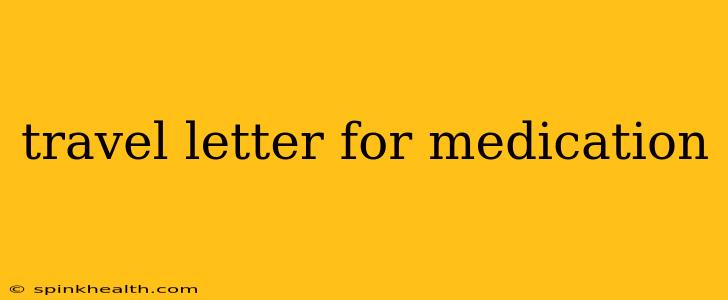Navigating the World with Your Medications: A Comprehensive Guide to Travel Letters
Traveling with prescription medication can feel like navigating a minefield. From airport security to customs checks in foreign countries, the process can be daunting. But fear not, intrepid traveler! This guide will equip you with the knowledge and resources to ensure a smooth journey, focusing on the vital role of a well-crafted travel letter for your medication.
Imagine this: You're finally on that long-awaited trip to explore the ancient ruins of Machu Picchu or the vibrant streets of Marrakech. You're enjoying the breathtaking views, savoring the local cuisine, when suddenly, you realize you've left your medication at home! Or worse, your prescription is confiscated at customs because you lack the proper documentation. This scenario, thankfully preventable, highlights the critical importance of preparation. A travel letter for your medication is your passport to a worry-free adventure.
What is a Travel Letter for Medication?
A travel letter for medication, often called a prescription letter or doctor's note, is an official document from your physician confirming your need for specific prescription medications during your travels. It acts as crucial evidence to authorities, particularly customs officials, that your medications are legitimate and for personal use. This prevents any misunderstandings or potential legal issues. It's more than just a note; it's your insurance policy against unforeseen complications.
What Information Should a Travel Letter Include?
A comprehensive travel letter should contain the following essential information:
- Your Personal Information: Full name, address, date of birth, and passport number.
- Your Physician's Information: Full name, contact details (phone number, email address, and practice address), and license number.
- Medication Details: The name of each medication, dosage, frequency of use, and the total quantity you're carrying. Include the generic name, as this is recognized universally.
- Diagnosis: A brief description of the medical condition for which you require the medication. This provides context and legitimacy to your need.
- Travel Dates: Clear indication of your travel dates (departure and return).
- Doctor's Signature and Stamp: Crucial for verification. The letter should be on official letterhead.
Why is a Travel Letter Necessary?
1. Avoiding Medication Confiscation: International customs regulations vary, and certain medications are restricted in some countries. A travel letter provides irrefutable proof that your medications are for personal use, decreasing the risk of seizure.
2. Ensuring a Smooth Airport Security Process: While unlikely to be confiscated, presenting your travel letter along with your prescription can help expedite the security check process.
3. Protecting Against Unexpected Medical Emergencies: Should you encounter a medical emergency abroad, a travel letter can assist medical professionals in quickly understanding your medication needs.
4. Legal Protection: In certain countries, possession of unauthorized medications can have severe consequences. The travel letter safeguards you against potential legal trouble.
How Long Should You Keep Your Travel Letter?
It’s advisable to keep your travel letter with you throughout your journey. Make a copy and leave one with a trusted person at home. Your journey's duration shouldn't influence its validity.
Can I Use a Translated Version?
While an English travel letter is generally sufficient, obtaining a certified translation in the language of your destination country is recommended, especially for countries with strict regulations. This eliminates potential communication barriers and ensures clearer understanding.
What if I'm Traveling with Controlled Substances?
Controlled substances require even more stringent documentation. Contact your country's embassy or consulate in your destination country well in advance of your trip to understand specific requirements and obtain necessary authorizations.
This comprehensive guide aims to equip you with the knowledge necessary to travel confidently with your prescription medications. Remember, preparation is key to a smooth and worry-free trip. A well-crafted travel letter is your first line of defense in ensuring a successful journey. Bon voyage!

